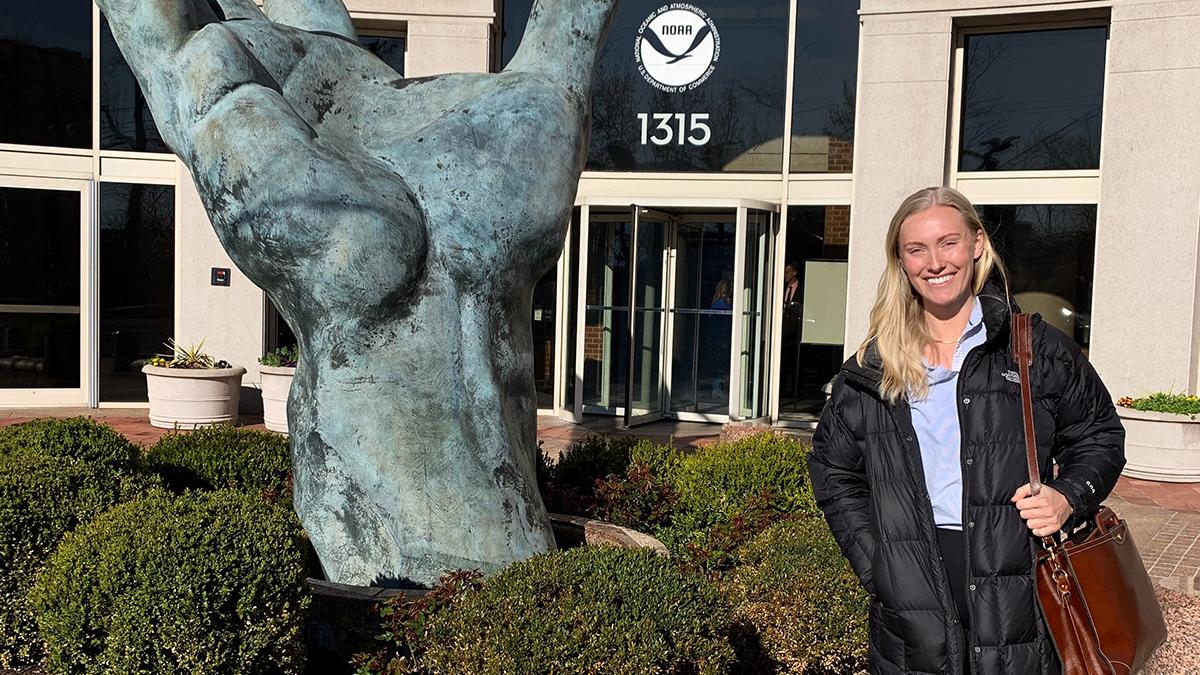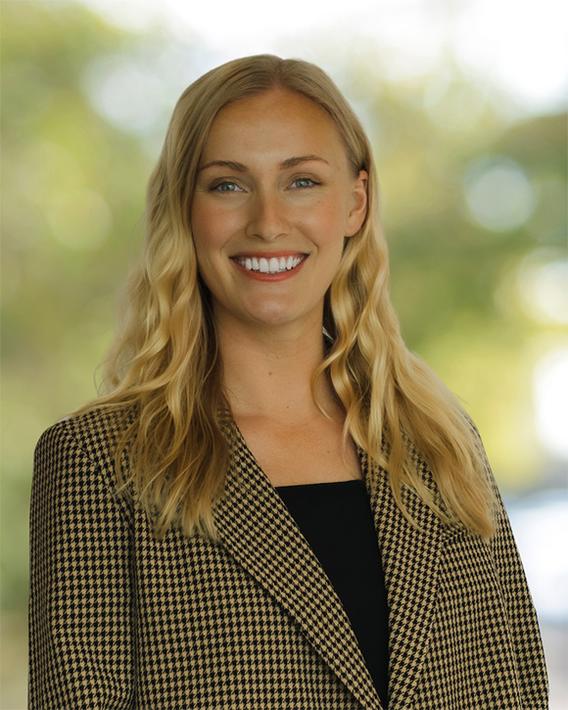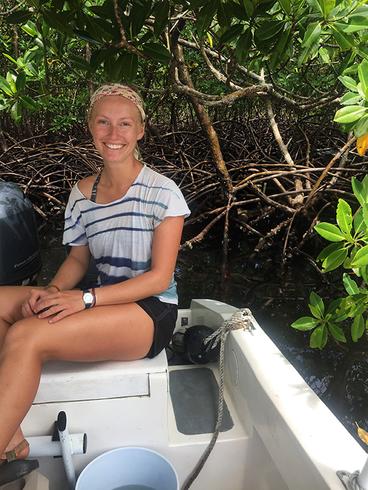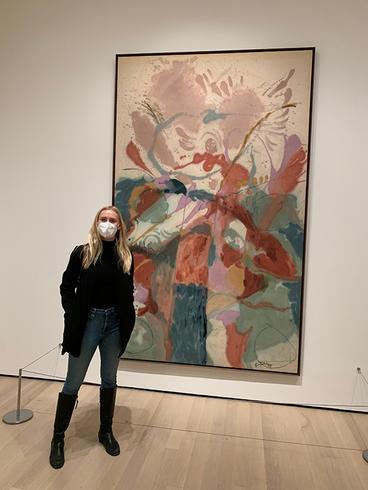
Our April 2023 communications column is by Minnesota Sea Grant (MNSG) Communications Associate Hannah Cullen.
Qualified graduate students are contributing to policy at the national level. Sea Grant Knauss Fellow Mary Collins is a coastal resilience specialist for the National Sea Grant Office, located near Washington, D.C., and is one of 86 graduate students to become a 2023 Sea Grant Knauss Fellow.
The Knauss Fellowship is an opportunity for students interested in ocean, coastal and Great Lakes resources to learn about and contribute to some of the federal policy decisions that may affect those resources.
Much like a watershed, national policy decisions can trickle down into communities where ocean, coastal and Great Lakes resources are a part of people's everyday lives.
Our Knauss Q&A’s are a way to get to know more about our Knauss Fellows, how they became interested in marine policy, and the work that they are doing for their federal government host offices.
Mary standing in front of the NOAA Sea Grant Office. Image credit: Mary Collins.
Meet Mary Collins.

“I’ve always bridged the divide between terrestrial and marine conservation and science,” said Mary.
Mary is a natural connector, bridging disciplines of ecology, social science, and art into her conservation and policy work. She received a bachelor’s degree in environmental science and art from the University of Virginia with focus on marine and tropical ecology, forestry, and conservation. During her undergraduate experience, Mary had opportunities to study abroad in short increments, conducting research as part of her coursework.
After graduating from the University of Virginia, Mary struck a job with the Smithsonian Tropical Research Institute in Panama, where she studied how the compounding effects of climate change affect marine invertebrates and coral reef ecology.

“I loved the research, but what I needed was an idea of how climate change and species research can be put into action for conservation,” said Mary.
After roughly six months of island life, Mary took a position in Silver Spring, Maryland, where she translated science into action as a conservation coordinator for the Wildlife Habitat Council.
There, she grew in an arena of nature-based solutions consulting for the private sector to help corporate facilities implement practices that support biodiversity, the variety and variability of life on Earth.
Then, the COVID-19 pandemic hit. “I figured I could keep working from home, or I could go to grad school, get a brand new degree, gain new and interesting skills, and that’s what I did,” said Mary.
Mary attended graduate school at Colorado State University, where she earned a master’s degree in global conservation leadership, “you could describe it as a degree in ecosystem management with a strong focus on social sciences and how to bring diverse groups of people together over conservation from community to global scale,” said Mary.
Mary’s interest in marine policy began in graduate school, while taking a class on conservation governance.
“I’m somebody who really likes systems, and I really like aligned action. It sounds really boring when I say it, but if multiple people across states and across regions are implementing the same methods and tracking progress, it makes me so happy. I love it. That’s policy, you know? That’s governance. That’s aligned governance mechanisms for positive conservation action.” - Mary Collins
This interest in policy led Mary to a position with the Council on Foreign Relations (CFR), where she worked while obtaining her graduate degree. Her work focused on climate diplomacy and climate resilience, culminating in contributions to the book, The Fight for Climate After Covid-19. “While it wasn’t marine focused, so many times what we’re talking about when it comes to resilience, is coastal communities. They’re bearing a large portion of costs associated with climate change impacts," said Mary.

Mary’s work with CFR informed what her capstone project would be for her graduate degree, which entailed working with the International Union for Conservation of Nature's (IUCN) World Commission on Protected Areas’ Marine Connectivity Working Group, hosted by the Center for Large Landscapes Conservation to create one of the first international guidelines for marine protected area ecological connectivity conservation.
The IUCN describes ecological connectivity as “the unimpeded movement of species and the flow of natural processes that sustain life on Earth.” Whether focused on the movement of species or the functioning of habitat networks, marine ecological connectivity conservation entails a systems approach to understanding and protecting.
With the Center for Large Landscape Conservation, Mary’s capstone project expanded into an international program conservation associate position. She advised countries and policy mechanisms, with the support of partners and working group members, on systematic integration of connectivity principles into landscape and seascape planning and protection.
Mary’s interest in the Knauss Fellowship stemmed from the new perspective that it could provide.
“None of the work I’ve done recently has been based in the U.S. So I wanted to bring lessons from this international setting down through national level, through regional level, through state level, and then to the community level to try to see how something like an international agreement or national policy can percolate down. And then how communities’ input could also percolate up,” said Mary.
How did you learn about the Sea Grant Knauss Fellowship?
“I actually first learned about it when I was living in D.C. and I attended my first Capitol Hill Ocean Week. I didn’t go with any friends. I just went by myself. I was right out of undergrad and a lot of the only other young people there happened to all be Knauss Fellows, and they were all saying, ‘You should apply.’ I put it on my back burner because at the time I wasn’t thinking of grad school yet. That’s where I first heard about it and then it kind of disappeared from my thoughts until my environmental governance professor mentioned it a month before the application was due,” said Mary.
You've been a fellow for two months, what about your fellowship has surprised you so far?
“Honestly, everybody is so open and willing to chat, and it might be because I’m a Knauss Fellow and being a Knauss Fellow comes with years and years and years of background and integration and building trust throughout federal agencies. People know us. That surprised me,” said Mary.
Tell us about your typical day as a Knauss Fellow.
“My typical day is a combination of, I would say, three different areas. One area would be on the Sea Grant Program level, which may consist of co-writing an article for an upcoming magazine with the Sea Grant Network, or assessing progress throughout Sea Grant Network projects in coastal resilience or blue carbon,” said Mary. “Other projects of mine have nothing to do with Sea Grant and are NOAA [National Oceanic and Atmospheric Administration]-wide, or even interagency-wide. Those focus on better aligning the tools and methods that are being developed for coastal resilience and climate change adaptation for broader and more accessible use. The third stool of my work is supporting resilience and water resources-related grant processes.”
What experience excites you most about your Knauss Fellowship?
“I have never had colleagues in my area of expertise; constituents of my same age, similar interests and experience. I’ve had very few because I’ve worked so much in terrestrial conservation. I’m really excited to learn from all of my friends about what they are doing in marine and coastal policy, and just have a network base of people who I relate to in the field,” said Mary.
What advice do you have for students considering applying for the Knauss Fellowship?
“Plan ahead. Be open. Be flexible. Within the actual application, don’t just talk about your grades or accomplishments, paint a story. The story should tell the reviewers and anybody who is able to look at it, not just what you do, but who you are,” said Mary.
More information about the Sea Grant Knauss Fellowship
- Minnesota Sea Grant Knauss Fellowship webpage.
- NOAA Sea Grant Knauss Fellowship webpage.
- Minnesota Sea Grant Knauss Fellowship - expression of interest.
- Contact Alex Frie, Minnesota Sea Grant research and fellowship coordinator for information.
What’s Minnesota Sea Grant doing for you?
- Sign up for Minnesota Sea Grant’s monthly newsletter for news, information and events.